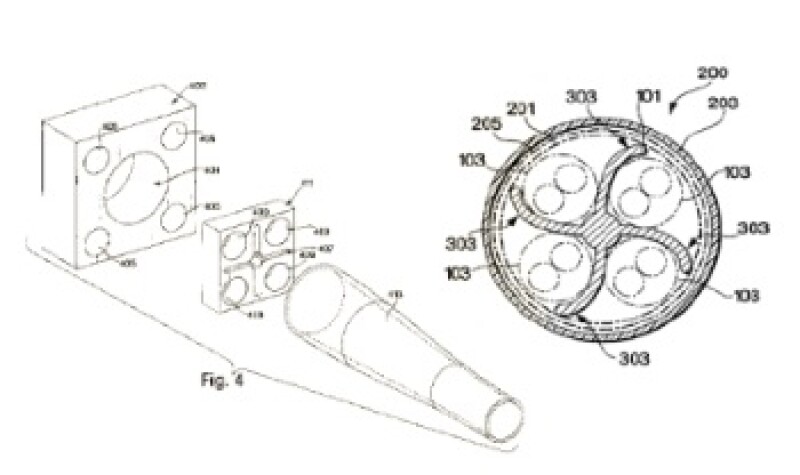In the Federal Circuit’s Belden v Berk-Tek ruling, the panel of Judges Newman, Dyk and Taranto affirmed the Patent Trial and Appeal Board’s rejection of claims 1-4, reversed the upholding of claims 5 and 6, and rejected Belden’s contention that the Board denied it procedural rights in the review.
The ruling is only the sixth substantive opinion issued by the Federal Circuit on a PTAB appeal, with more than 80% of cases so far affirmed with a Rule 36 Judgment. It is only the second case to reverse the Board after Microsoft v Proxyconn.
Matthew Lowrie of Foley & Lardner represented Belden. James Blank of Kaye Scholer represented Berk-Tek.

US Patent No. 6,074,503 discloses a method of making a cable by passing a core and conducting wires through one or more dies, bunching the wires into grooves on the core, and twisting the bunch to close the cable, and jacketing the entire assembly. It contained four claims that issued in 2000. Two more claims were added in 2010 in an ex parte re-examination. Claim 5 requires the transmission media be “twisted pairs of insulated conductors”. Claim 6 is dependent on claim 5, and requires four such pairs.
The “finding rests on legal errors”
The Board found likely obviousness of all the claims based on Japanese Patent no. 19910 and Canadian Patent No. 2,058,046.
Regarding claims 5 and 6, the Federal Circuit said: “Even giving the Board the deference it is due under the substantial-evidence standard of review of factual findings, we agree that the record requires the finding Berk-Tek urges. The Board’s contrary finding rests on legal errors.”
It said that the two pieces of prior art in combination teach or suggest the methods of the two claims. “The dispute concerns motivation to combine,” said the Court.
The petition and institution decision suggested two ways that the issue could be considered: whether a skilled artisan would substitute the twisted pairs of the Canadian patent into the Japanese one, and whether a skilled artisan making the cable in the Canadian patent would look to the method of the Japanese one to make it.
The Federal Circuit concluded that the evidence points clearly towards a motivation for a skilled artisan to arrive at the methods of claims 5 and 6 based on the two pieces of prior art.
“None of the Board’s reasons for concluding otherwise in its final written decision withstands scrutiny through the lens of governing law,” it said.
It added: “In short, the record is one-sided on the proper question of whether JP ‘910 taught a solution to the problem of aligning cable components that a skilled artisan would have been motivated to use in making CA ‘046’s cables. The Board erred in determining that Berk-Tek had not proven the obviousness of the methods of claims 5 and 6 of the ‘503 patent by a preponderance of the evidence.”










